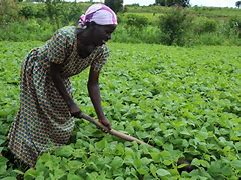Mamahali Peete, a mother of three children, left her marketing career in the vibrant Johannesburg city in the neighboring South Africa and relocated to Lesotho when she got married. Three years in the country she ventured into farming in the rural area of Bela-Bela, and she has never looked back since. She rotates between growing beans and maize on her 30 acres of land.
“Agriculture was not my first choice of business. But realizing the local demand for food I decided to give it a shot. Living in Africa, I now see a lot of potential in agriculture. There will never be a time when people don’t need food. The demand for food is even higher in Lesotho,” said Mamahali.
Lesotho is a net importer of agricultural products, with 30 percent of its total food requirements produced locally and the remaining 70 percent imported.
Building mutually beneficial partnerships
Mamahali is one of the first ever bunch of farmers who signed up for Contract farming – a kind of trading arrangement that is not common in Lesotho. The Contract Farming initiative was pioneered by the Food and Agriculture Organization of the United Nations (FAO) in the country as an innovative business model establishing meaningful market linkages between farmers and the market.
Mamahali and 29 other farmers signed the contract with ‘Tasty Food Packers’, a leading Pulses supplier in the country. At the end of this season, Mamahali made her first delivery to the company.
“Contract farming brings security and gives us farmers bargaining power. It also motivates us to work hard to honor our portion of the deal. For example, this season we received agricultural inputs late in the season, but I tried everything possible to grow so that I can make delivery,” says Mamahali with a smile of triumph.
Promoting innovations, markets access
Under the agreement, ‘Tasty Food Packers’ buys the beans from all the farmers it has contract with at an agreed price for the produce delivered. However, if there are fluctuations in prices during the harvest season, the two parties can revise the prices, and the same can be for the quantities.
“I didn’t have a guaranteed market for my beans. Every season we have to look for potential markets. Sometimes we are not sure if our last buyer will be willing to buy from us the next season’s harvest. I made my first supply of beans to the buyer. It inspires me to work hard and honor the agreement,” says Tlalane Sebeko, block farmer from Berea.
The farmers and the buyer who signed the contract were trained to increase their understanding and knowledge of Contract farming, and their fields were monitored right from planting to ensure good production and productivity, thanks to the support from the Ministry of Agriculture Food Security and Nutrition of Lesotho in collaboration with FAO.
Collateral to access finance
Most financial institutions in Lesotho just like elsewhere in Africa, have provided limited or no credit and insurance to farmers, although farmers represent the biggest opportunity for scale and impact in financial inclusion today. This is largely due to the fact that agriculture is considered a highly risky business undertaken with limited risk mitigation or sharing measures. About 80 percent of Lesotho’s rural population depends on the agricultural sector for their livelihoods. With proper investment and improved access to market agriculture has a huge potential to contribute to economic growth and uplift the livelihoods of the rural populations.
Contract farming assists with credit because most of the time financial institutions accept contracts as collateral for a loan directly to the farmer.
“Access to finance has been a challenge to farmers in Lesotho. Banks and Insurance companies here fear to give us loans, yet our saving capacity is low. However, when Banks learnt about this Contract farming, they told us that they were going to tailor-make a product for farmers. I will be applying for a loan soon using this contract,” says Tlalane Sebeko with excitement.
Integrating actors in the agricultural value chain
Nizam Abubaker, owner of ‘Tasty Food Packers’ said the contracts will enable his company to get steady supply as he is currently importing most of the beans from the neighbouring south Africa to meet the demand in Lesotho.
“Communication is important during the season so that if the farmer encounters difficulties let’s say unfavourable weather conditions or poor harvest, we are aware and can trigger the ‘force majeure’ clause in the contract that protects farmers from uncertainties,” says Nizam Abubaker.
Nizam acknowledges that Contract farming is a win-win arrangement for both the farmer and the buyer, however noting that the government should work to establish laws regulating contract farming to protect and efficiently integrate producers and actors down the value chain, such as agribusiness, processors, exporters, or retailers.
FAO would like to see the Ministry of Agriculture, Food Security and Nutrition Expanding Contract farming to other commodities such as vegetables, maize, and others in Lesotho, which would eventually give farmers the opportunity to diversify into new crops, which would not be possible without available and stable market.

















